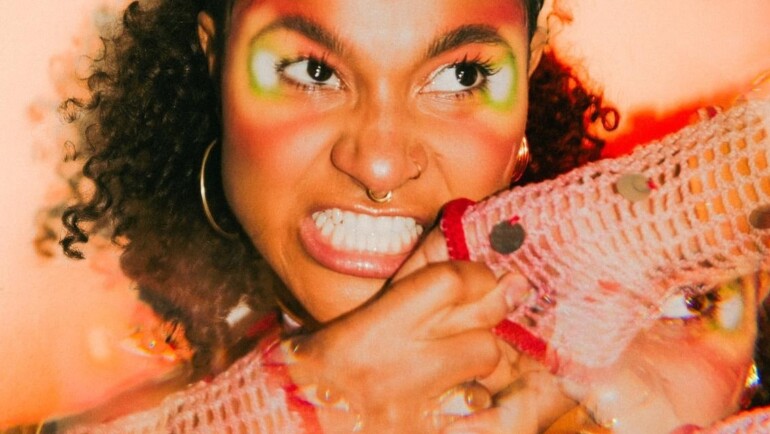
The 21-year-old Upper Austria native has just released her debut EP, “Golden Days”, and is on the fast track to becoming a star of the domestic music industry: Uche Yara is the FM4 Soundpark act of the month.

Some people are just destined for greatness – and I daresay Uche Yara is one of them. “I know a Grammy winner when I see one,” reads one comment under the YouTube video of her Colors performance in Berlin. Another calls her the “most creative voice in the game right now”. Her playing, her voice, her creativity…and with that, we’re already deep into Uche Yara’s world.
As we talk on the phone, Uche Yara is already well into preparations for her tour. It’s only been a few days since her Colors performance went online and since she landed on the cover of Spotify’s “genre-neutral” Pollen playlist. It’s only been around since 2018, but the playlist has already become something of an institution. With over 1.3 million followers pulling songs from it daily, it’s an important tastemaker and often serves as a booster for unknown indie artists. These are the kind of steps that gets Uche Yara talking in superlatives. “My stomach is constantly turning over; there are just so many exciting things happening,” the 21-year-old answers when asked how she’s doing. “I’m constantly in disbelief. I look at the whole thing, and, yeah…I just can’t really grasp it.”
Real & uncomfortable
Flashback: it was just about two years ago that Uche Yara appeared on Austrian stages for the first time. Out of the blue, as opener for one of the country’s biggest bands. A teacher at her secondary school in Linz got her in touch with Bilderbuch (interesting – Upper Austria again, Linz again). Uche Yara had a stage presence that made you think she’d never done anything else in her life.
Music was always around, of course; she was taking percussion lessons at seven and started electric guitar at thirteen. But the idea of doing it for a living didn’t occur to her till after she had finished school, with the connection to Bilderbuch: “I originally wanted to be a doctor and just make music as a hobby, play somewhere on weekends. But that was off the table pretty quickly,” she laughs. Thank God for that.
And so she came to music – live, whenever possible. “There’s nothing left that you can touch in this digital world, nothing you can really see,” Uche Yara says from her little studio in Berlin, where she moved after she finished school. “I found the approach interesting, to bring it to people first. I was starved for human contact, and so was everyone else, to consume real music. I mean, music on your smartphone is real, too, but I just felt like [live] was more natural for me. Especially with the uncomfortable music I write.”
Real music. Uncomfortable music. You see which way we’re tending here – Tierra Whack, Tyler the Creator, James Blake, Dev Hynes, Rosalía – all names that come up when we start talking about role models. In addition to Bilderbuch, of course. Virtuosos of modern pop, people who think about music holistically, who have made an international name for themselves with their unique – or at least atypical – approach to pop.
Uche Yara sees the music in a wider sense, too. The sound, the visuals, the outfits, the stage design are all part of it; they all communicate warmth and unconventionality. Genres only appear as cameos – grungy guitars, (neo-)psychedelia à la Tame Impala or Lil’ Yachty – but that’s beside the point. The point is Uche Yara’s voice – her plaything, her main instrument.
First the sound, then everything else
How does that work, in Uche Yara’s head? The way she tells it, a song begins with a simple feeling, an impulse that becomes a sketch on the guitar or the drums, until recording starts…”and then, it’s a little like being high, like a tunnel I get pulled into, and things are clear without me having to actively think about them. And then, suddenly, it just is.”
So she doesn’t really think a lot about words and lyrics…but she’s still a great songwriter. Take “Sophie”, a song from the perspective of a man who abuses his partner: gaslighting, manipulation, physical abuse…all those things that happen far too often. “It feels very natural to take on different roles with my voice. I hear the melody, and I immediately hear the vocal color I want to sing,” she explains. American rapper Tierra Whack was a major influence in this respect: “That was a really important discovery in terms of vocals.”
The genesis of “Sophie” was the line “Sophie, you’re so mean,” sung in a deep, powerful voice. “And then I sat down and thought, okay, how can I continue this? And then of course there was immediately the idea of a love song – ‘oh, Sophie, she left me, it’s so sad,’ blah, blah, blah. But I got bored with that really quickly, and I started thinking, what’s a really current issue; what do I find interesting? And then I got the idea for this back-and-forth with the roles.”
“I grew up in paradise.”
It’s a dynamic that happens again and again with her. “www she hot” is a sort of collective request for forgiveness for the way we’re treating the earth. On “ZUU (zoo)”, her newest release, she adopts the role of a fictional zookeeper. “I’ve done a bear feeding, I’m sick of this / supervised a schoolkids’ group trip / this hornless rhino, isn’t it innocent? / Didn’t I just clean up that mess in its cell? / Still got some pig poo-poo on my polo shirt / seal leaps through that loop in that fishtank“. Storytelling at a very high level. World-creation, characters awoken to life, always hidden behind layered backing vocals, distorted guitar solos, and percussion breaks.
It doesn’t come all that easily, though. Asked about her approach to storytelling, Uche Yara says, “that really stressed me out for a while. A lot of artists that I admire have really difficult backgrounds. They’ve seen it all, and they can write their lyrics about that. ‘It was so rough where I grew up.’ But I grew up in paradise.” She laughs. “So I just use stories or take my inspiration from films.”
But sometimes, the “real” Uche Yara does emerge – when it’s about homesickness, like on “Yesterday I Was In London”, or talking about new beginnings on “Golden Days”. “I used to daydream about you, my dear past. / Looks like it’s a dream I’m living; future will make it last.” A dreamy view of the past; a hopeful look into the future. “I like the fact that parting has a positive connotation in the song. So often it means heartbreak, it’s super hard to leave, but hey! When you say goodbye to something, it’s always a beginning.”
“Golden Days” is one of the new/old tracks on the brand-new EP of the same name. Old, because she wrote it while preparing for final examinations at school – like other songs that have been lying around as Logic projects for years on her laptop. “Going through those projects, I felt like I was following the trail of the original Uche Yara, ” she says, laughing. She remixed them for the EP to give it a common thread, so that the older songs would go with the new ones, like “ZUU (zoo)”. “That wasn’t an easy process. You have to be really careful; you don’t want to destroy the original spirit. But on the other hand, you do want to improve things…I can just say, it’s an interesting trip.”
With “Golden Days”, Uche Yara embarks on her big European tour; the only stop in Austria was in the sold-out Porgy & Bess in Vienna on Saturday evening. What to expect on the tour? “I can imagine that this dialogue might really escalate, in a positive sense – I give something, and the audience is into me and gives it back. And then it will become a really beautiful, collective experience.”
– Melissa Erhardt, translated from the German original by Philip Yaeger.



